-
Welcome to rpgcodex.net, a site dedicated to discussing computer based role-playing games in a free and open fashion. We're less strict than other forums, but please refer to the rules.
"This message is awaiting moderator approval": All new users must pass through our moderation queue before they will be able to post normally. Until your account has "passed" your posts will only be visible to yourself (and moderators) until they are approved. Give us a week to get around to approving / deleting / ignoring your mundane opinion on crap before hassling us about it. Once you have passed the moderation period (think of it as a test), you will be able to post normally, just like all the other retards.
You are using an out of date browser. It may not display this or other websites correctly.
You should upgrade or use an alternative browser.
You should upgrade or use an alternative browser.
Stellaris - Paradox new sci-fi grand strategy game
- Thread starter Perkel
- Start date

Historically, slaves have been known to not renew themselves too well naturally.You need to research robots before you can build them, I don't think they're available at game start. And unlike slaves, robots can revolt if you let them get smart enough. Finally, slaves are a naturally occurring and renewable resource.Why should slaves we able to revolt? This is sci-fi, they get their loyalty chips and be good little drones.
(Why slaves in the first place? Why not robots?)
Hence why the constant need for new conquests (Rome), or at least new shipments(American colonies).
Got bored and left
Guest
I'm sure you could set up slave breeding programs in a sci-fi setting, though. That actually could be a fun (and by fun, I mean absolutely horrific) mechanic.
Sranchammer
Arcane

It seems like the DLCs will revolve around alien races
kris
Arcane
It seems like the DLCs will revolve around alien races
and hopefully more mysteries and things to discover.
Historically, slaves have been known to not renew themselves too well naturally.You need to research robots before you can build them, I don't think they're available at game start. And unlike slaves, robots can revolt if you let them get smart enough. Finally, slaves are a naturally occurring and renewable resource.Why should slaves we able to revolt? This is sci-fi, they get their loyalty chips and be good little drones.
(Why slaves in the first place? Why not robots?)
Hence why the constant need for new conquests (Rome), or at least new shipments(American colonies).
It depends on where, in the USA slaves renewed themselves quite well, in Rome I think by law children of slaves were born free so obviously that didn't happen.
- Joined
- Jan 28, 2011
- Messages
- 97,503















Reviews are coming in.
http://www.eurogamer.net/articles/2016-05-09-stellaris-review
http://www.eurogamer.net/articles/2016-05-09-stellaris-review
Stellaris Review
So much space for activities!


More approachable than ever, Stellaris is the Paradox grand strategy game you need to play.
Space is quiet, for a little while. Unlike Paradox's other grand strategy games, Stellaris doesn't tell you everything from the start. You're not ready for that yet. If you're a bit of a space romantic, you might look out at the great expanse and get a sense that something's happening out there in the darkness. It has to be, surely? But right now, your concerns are much smaller than that. Before you can think about colonising distant worlds or subjugating alien races, you first need to understand your own solar system. This takes time, as you send a scientist, aboard their own ship, to scan each of the planets and determine whether there's anything useful to research, or mine. Whilst you're doing that, you might want to think about improving the infrastructure on your home planet, or spending some influence to increase the amount of food being produced. This is how the very early game plays out. You're not a galactic powerhouse, not for the time being. You're a single planet that's just getting to grips with spaceflight.
And yet, each time you unpause the game and watch your tiny civilisation slowly reaching outwards, it's humbling to think about the other empires - big and small - that are doing just the same. You won't know where they are, what they look like, or what they believe in, but they exist and eventually you're going to meet them. I love the sense of inevitability. This added emphasis on exploration also does a couple of really useful things for Stellaris, compared to other games from this studio. Starting small gives it a chance to drip feed information to the player as they go, avoiding that overwhelming moment that comes with starting a game of Crusader Kings 2, or Europa Universalis 4. You don't need to spend 30 minutes assessing the military strength of your neighbours, because you haven't even met them yet. That makes for a much, much easier introduction.

I named our second planet after my favourite chocolate bar.
This idea of venturing into the unknown also ensures that first contact feels incredibly important. And shouldn't it?! In Stellaris, that single moment changes everything. Up until this point you'll have been blundering between a handful of solar systems, researching tech that sounds flashy and maybe expanding your military a bit, because that feels like the right thing to do. Now, finally, you have someone to compare yourself to. This is huge! How have they already colonised three planets, you might ask. Should you have been doing that? Are you already behind the galactic curve? The rest of your game will involve comparing yourself, sometimes enviously, to other empires. Your brief window of naivety is over.
My first contact was with an alien race of molluscs called the Djomars. They had quite a few more eyes than my own human population, which was concerning, but worse than that, they didn't really like us very much. In fact, they didn't particularly like any race that wasn't the Djomars, and they weren't crazy about our views on individual freedom either. Not a great start, to be honest. Every empire in Stellaris - aside from your own, which can be selected from a list of premades, or entirely customised - is procedurally generated. Unfortunately, in this case, the Djomars had been procedurally generated to hate me.
There are some rules in place, to ensure that the empires you encounter make some degree of sense. Certain traits are associated with certain government types, to avoid any weird juxtapositions. As a result, these alien races you encounter feel hand-crafted, despite coming from a gigantic pool of species/government/belief combinations. I'm also a big fan of the two-word descriptions Stellaris uses to convey the many different government types to the player - ranging from boring things like 'Military Dictatorship', to much more exciting words like 'Enlightened Monarchy' or 'Plutocratic Oligarchy'.

The Commonwealth of Yibar has zero chill.
The one useful thing about finding yourself neighboured with an empire of space racists, is that chances are, nobody else will like them much either. After a few decades of peaceful expansion, I would draw borders with a number of other empires, one of which happened to share many of the same principles as my own. The Igarian Sovereignty were a Democratic Utopia (good!) and they considered themselves individualists (good!). They also sort of looked like anteaters wearing clothes, which I was really into. An obvious alliance in the making.
When war is declared in Stellaris, it often seems to come down to one, big decisive battle. Depending on the preferred method of FTL technology (warp, hyperspace, or wormhole), you may find that your fleet can outmaneuver the enemy, but to achieve a high enough warscore to, say, vassalise the Djomar Empire, you have to take out their fleet.
As with Paradox's other grand strategy games, the combat mostly comes down to preparation. Each fleet displays a military value, which means you should have an idea of how you'll fare in battle. In my experience, ensuring you have a larger number than your opponent is always the key. Depending on the research path you choose, you'll unlock new ship designs, weapons, shields and other bits and pieces. Then, using a fairly rudimentary ship builder, you put together a design that you want to integrate into your fleet. Most of this can be automated, including any upgrades for your existing ships, which is a relief.

I think I'm winning?
The battles themselves end up quite a passive affair for the player. Other than selecting targets and giving the order to retreat, your influence over what's happening within the engagements themselves is pretty minimal. Thankfully - and this is something of a first for Paradox - they're really fun to watch. Witnessing two large fleets clash becomes a frenzy of laser fire and explosions, with colossal (expensive!) ships being torn apart in real-time. We've never had that before, and it adds a lot. Losing a fleet isn't as simple as watching a number deplete, it's a furious mess of colour and noise. There's even some basic camera controls, allowing you to find your preferred angle with which to watch. Paradox, you're spoiling us!
Perhaps the most impressive thing that Stellaris manages, though, is the way in which it continues to keep the player in check. In most grand strategy or 4X games that I've played, the early game is always the highlight. Once your family/nation/empire grows to a certain size, you become unstoppable. The game is essentially over at this stage, as you steamroll your way towards whatever victory condition you have in mind. Stellaris makes this much more difficult.
We've talked about the early game, in which you explore and interact with other empires individually, but later on this gives way to something bigger. Unless you're pursuing a very aggressive, isolated campaign, you'll find that alliances prove vital. The relationship I formed with the Igarian Sovereignty was the reason I managed to stay competitive on a galactic scale. As you approach the mid-game, you'll find that many of the strongest empires began to team up with like-minded allies, and if you don't follow suit, you simply won't be able to stand against them.

Approaching the mid-game.
These powerful alliances eventually give way to federations, which allow for multiple empires to operate as a single entity. A president will be regularly elected, and should they come from your empire, you'll be in such an important position - dictating the foreign policy for the entire group and building ships using their very best technology. The mid-game is all about federations.
Even if you manage to control the most powerful federation in the galaxy, Stellaris still isn't ready to let you sit comfortably, introducing the possibility of late-game catastrophes. Usually the result of overambitious research, these events provide one final opportunity for the player to lose everything, even after making it tens of hours into a campaign. My favourite example of this is the AI revolt, which sees synthetics across the galaxy turning on their former rulers. Perhaps you've benefited from a robotic workforce, or perhaps you're not even remotely responsible: it doesn't matter. You're now up against a single, galaxywide faction and everything can fall to pieces. Finally, the late-game matters.
In many ways, the Stellaris I've played is but a starting point for modding support and a DLC plan that'll keep us going for years to come. But what a starting point it is! Leaving behind the shackles of historical accuracy has allowed Paradox to play around with so many new ideas, but somehow, whilst doing so, they've created a grand strategy game that isn't entirely terrifying to start playing in the first place. If you've ever wanted to dip your toe into this incredible genre, but found Paradox's other stuff a bit intimidating, this is the one to play. If you've enjoyed their other stuff, this one's even better.
- Joined
- Jan 28, 2011
- Messages
- 97,503















https://www.rockpapershotgun.com/2016/05/09/stellaris-review-pc/
Wot I Think: Stellaris
Adam Smith on May 9th, 2016 at 2:45 pm.
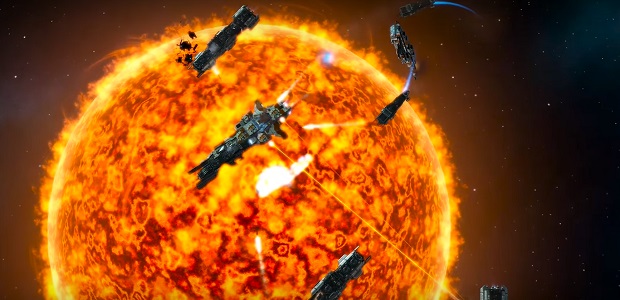
Stellaris [official site] is one of the most eagerly awaited strategy games in years. Known for their historical grand strategy games, Paradox Development Studio have turned their attention to the stars, with a game that attempts to create a sense of sci-fi mastery through its randomisation of everything from the galactic map to the traits and behaviours of individual species. But in marrying traditional 4X systems to the complexities of their previous offerings, have Paradox found a fine balance or a series of compromises. Here’s wot I think.
Stellaris is a true hybrid. Throughout its design, the threads of 4X games are stitched through the tapestry of Paradox’s patented grand strategy style. In that, it’s a success, intelligently recognising which elements make for happy shipmates and jettisoning the rest into the void, or reconfiguring them to find a happy middle-ground. It’s the company’s most elegant and accessible strategy game, with an interface that while not far removed from the likes of Crusader Kings II or Europa Universalis IV, has undergone a nip and tuck to hide unnecessary complications and direct the eye (and the mouse pointer) toward what is essential at any given time.
It’s tempting to assume that if you’re interested in Stellaris, you already know what to expect from a 4X game, and how that might differ from a grand strategy game. Perhaps you’ve been brought here by the lure of dynamic science fiction stories rather than taxes and trade though, and if that’s the case here’s a quick primer on what Stellaris seeks to achieve, and for those in the know, I’ll begin to explain how well it all works.
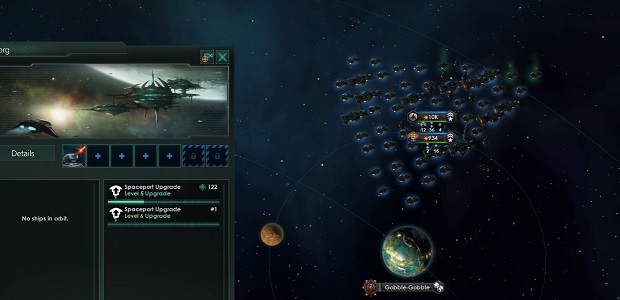
4X games take their name from the central activities that make up playtime: eXploring, eXpanding, eXploiting, and eXterminate. From tiny beginnings, your chosen nation/faction/race explores the world, starting with their immediate surroundings, builds new settlements to expand, exploits the resources that they find and the relationships that they nurture, and exterminates anyone who gets in the way. The balance between the four Xs depends on your playstyle and the particular situations you find yourself in, but the general shape of such games tends to involve uncovering the map from behind a fog of war, and then painting it red/blue/green/yellow/fuchsia.
Stellaris follows that formula but upsets the march toward domination with several tricks borrowed from the less predictable and linear shape of Paradox’s grand strategy games. You begin with a single planet, your species’ home world, and most other players are in the same position. Faster-than-light travel is a new discovery and you’re likely to spend the first stages of the game exploring your own system, searching for exploitable resources on nearby planets and moons as you prepare to head out into the galaxy.
Even before the game proper begins, your choice of FTL technology determines how you’ll explore. You can choose between three possibilities – hyperlanes, warp or wormholes – and each fundamentally changes the way your experience plays out, from beginning to end. A game played with hyperdrive tech can see you bottled into a corner, with dead-ends and angry amoebas all around, while working with warp or wormholes is initially liberating but has its own drawbacks.
Whatever your FTL choice, science ships will undertake most of your early exploration. They’re a combination of scout and research vessel, able to survey new systems to tag resources while also discovering anomalies to investigate. Those anomalies and other discoveries mark one of the larger most obvious interruptions to the traditional shape of a 4X game.
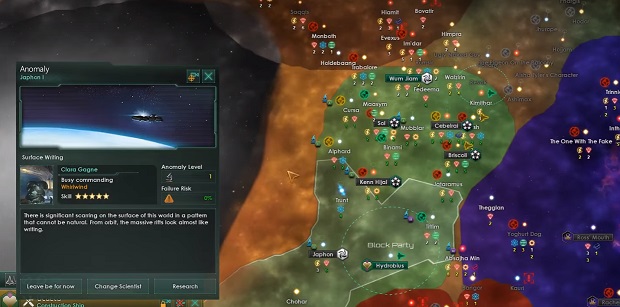
Some are little more than the interstellar equivalent of Civ’s goody huts, providing a boost to resources or research values, but even those lesser events are elevated by the quality of the text that introduces them. One of Stellaris’ great strengths – strange to say for a strategy game – is in the writing. From the humour of the diplomatic messages that encapsulate ethical stances in tidily composed sentences to the longer event chains, and the mysteries and wonder they contain, Stellaris does flavour text so well that it becomes plot.
It’s the best-written strategy game since Alpha Centauri, drawing in ideas from almost every strand of science fiction and giving them space to add colour and interest to the galaxy. While the simplest discoveries play out like goody huts, the more complex event chains are almost reminiscent of Sunless Sea’s stories, with various avenues of possibility, and outcomes that are restricted by and later inform the character of your empire and founder species. It’s in these that the game finds the sweet spot between its strategic systems and its urge to tell every sci-fi story under/in/around every sun.
This is nowhere more apparent than in the late-game crises. These are not so much ‘event chains’ as ‘event bombs’, blowing the game wide open by introducing new dangers and tearing empires apart. They’re triggered by the activities of players, both AI and human, with an element of randomisation to determine if and when they begin. Certain elements must be in play before the genesis event for a particular crisis begins and even then, they can be defused. Strategy games may be built on a foundation of numbers but one of Stellaris’ great strengths – not unexpected given its pedigree – is to elevate words to almost equal importance.
Let’s talk numbers though. The purpose of the crises and other event chains, including the pre-sentient and pre-FTL species that can be discovered across the galaxy, is to add wrinkles to the natural progression of a 4X game. The same is true of Fallen Empires, which are bloated, powerful but stagnant AI entities, each with their own personality type. All of these things interrupt the march toward victory, either by placing speedbumps in the road or – far more intriguing – providing alternate routes. Rather than navigating a path that leads toward victory, avoiding obstacles and taking advantage of speed boosts, you’re exploring possibilities. Sure, you can ruthlessly exploit and exterminate in a way that isn’t always feasible or satisfying in CK II or EU IV, but even though there are victory conditions to achieve, the game encourages you to take the scenic route. There is almost as much value here for sightseers as for those wishing to soldier toward dominance.
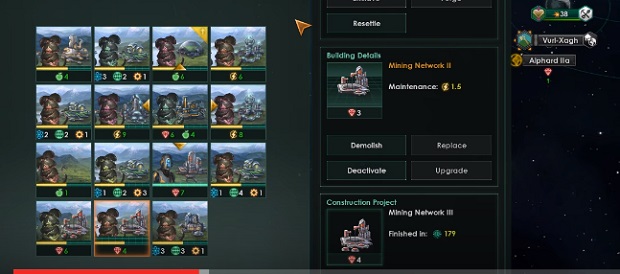
Despite all of the plotting and the diverse range of species you’ll encounter, Stellaris is relatively transparent when it comes to the numbers. There are three basic resources, two of which are mined from the map and one that stems from your status and control of your population. The physical resources – energy and minerals – are, respectively, a form of galactic currency and the war material from which ships and planetary improvements are constructed. In simple terms, minerals help to build the foundations of empire and energy ensures that the lights don’t go out.
Both of these resources can be detected on planets and in stars through use of survey ships. Ideally, you’ll want to build a mine to suck up every item within your empire’s borders and the galactic map does a splendid job of highlighting precisely what is available in every system, and whether a construction ship has already built the necessary facility to take advantage of the bounty. Until matters become complicated by conflict later in the game, the shiny green numbers next to your mineral and energy stashes should be ticking upwards at a steady rate.
You won’t have to worry about inflation or exchange rates or the cost of shipping minerals from the homeworld to a distant outpost. If the numbers are going up, you can spend the resources as they arrive and not worry too much about where the next batch are coming from. As a game of resource management and exploitation, Stellaris is extremely easy to come to grips with, and even when new tech unlocks rewarding strategic resources to capture, capturing and utilising them is a simple case of controlling the correct system and building a facility to extract them.
This feels like the right choice for a game that is more interested in the complexities that arise within an empire than the basic infrastructure of that empire. From the very beginning of a game, whether you decide to craft a species and government or play with a random creation, Stellaris places you in a very specific role. You’ll be assigned, or select, a handful of traits – both negative and positive – that define your species. There are only a few negative traits at present, which prevented me from trying to take a pile of idiotic jellies into space, and ethics aren’t classified as either positive or negative. They simply permit/forbid certain behaviours. Are you a xenophobic democrat terrified of every shadow you see in space or the ruler of a pacifist race of religious fanatics? Would you prefer to build a galactic federation of peacekeepers or an ugly alliance of convenience, ready to shatter as soon as the knives grow long enough?
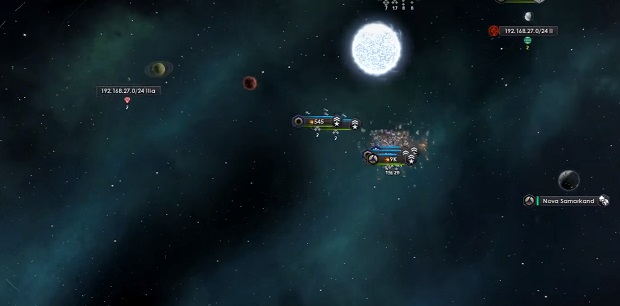
Every choice comes with certain restrictions. Certain ethical codes will prevent you from enslaving members of your own race, which can speed production while reducing happiness, while others will prevent you from making certain decisions during event chains. Everything from the migration of people within the galaxy to the level of orbital bombardment that can be used to soften up defenses prior to a planetary invasion is determined by the outlook of your species. In that sense, Stellaris forces you to roleplay, creating boundaries that cannot be crossed, and the people who get the most out of the game will be those who take that roleplaying ball and run with it.
Because the characters who take up positions within your empire aren’t as numerous or as convincingly fleshed-out as those in Crusader Kings II, Stellaris has much less scope for the kind of interpersonal stories that make that game such a delight. A scientist exploring the fringes of the universe, and the fringes of knowledge, might gain new traits as a result of her experiences, but she won’t have a family to care about back at home. Leaders provide bonuses based on their own traits and different government types have different rules for when the top job changes hands, but the only personality on show is for a species as a whole rather than for the individuals within that species.
From a diplomatic perspective, that makes the game much tidier. You’re dealing with a type of negotiator rather than one person bringing their own motivations to the table, interlaced with the needs and fears of an empire. This is a trend that runs through the whole game – it’s neat, legible and compact. Sure, it’s “grand strategy on a galactic scale” just like the tagline says, but Stellaris is a game that shows its hand at all times. There are surprises, both pleasant and perilous, but it’s possible to keep track of and account for every element in play at any one time. Compared to the rich complexities of its Paradox predecessors, that may make Stellaris seem either disappointingly anaemic or exquisitely lean depending on what you want from the game. While there are certainly areas that I find a little too thin, I find the overall structure an almost perfect fit.
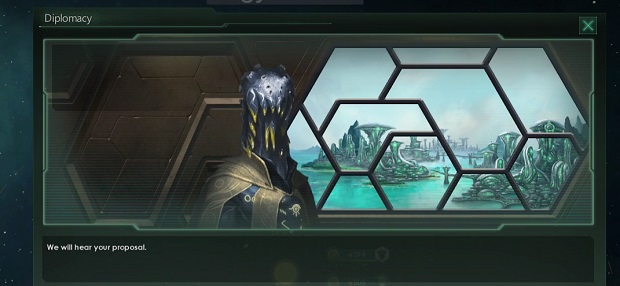
In terms of the game’s systemic integrity, the clarity of statistics and interactions means that everything is on show. Want to know why those molluscoid militants won’t agree to peace? The game can break it down for you in a way that is almost immediately comprehensible, and you’ll be able to figure out what steps need to be taken to change the situation. Noticed a sudden shortfall in your energy output? Hover over the resource bar at the top of the screen and a tooltip will explain all (you’ve almost certainly got too many ships in fleets that aren’t locked in expense-saving orbit).
Combat is the one area where the game stumbles slightly in this regard. Every individual ship has its components and size translated into a single number, conveying military strength. A fleet has an overall strength derived from the sum of its parts. However, there are complexities behind that number that might cause an apparently superior fleet to come a cropper.
First of all, you’re going to lose some military strength every time the enemy destroys one of your ships. That means a single ship with a military strength of 1k has an advantage against twenty ships with a combined strength of 1.2k – that second fleet will become increasingly feeble as the battle progresses, whereas the 1k ship effectively operates at 100% efficiency until it falls to pieces. Further to that, the military strength doesn’t take into account components that might have been put in place to counter a specific threat. Weaponry divides into three basic types – lasers, projectiles and missiles – and certain defenses work better against certain offense. The military strength of a fleet gives a rough estimate of how they’d cope in an even battle, but battles aren’t always even. And because conflicts actually play out on the map – and look rather handsome as they do so – there’s at least a small element of simulation. Slow moving ships will struggle to close the distance which could be a problem if they don’t have long-range weaponry.

All of which is to say, relying on the military strength reading and the “auto-best” option for ship construction and upgrades can lead to disaster. Adjustments are easy to make on the ship design screen – and the ability to simply click a button to automate the process of returning to the nearest spaceport and upgrading is a godsend – but I’ve spent a great deal of time building fleets and often feel that their success comes down to the luck of the draw somewhat. If I don’t have the right tech to punch through an enemy’s shields quickly, military conquest becomes much more expensive and time-consuming.
Tech doesn’t entirely come down to the luck of the draw though. Research is the other area of the game, alongside combat, that threatens to muddy the waters of clarity. Conducted in three areas, tech research provides new options whenever current work in each area has been completed. The new options are randomised, though with weighting to provide a greater portion of ‘cheap’ tech, lower down the ‘tree’. Occasionally you’ll see a rare piece of tech or a costly invention that feels like it should come much later in the game.
Usually, there are three choices but you can open up more slots, either by performing research on the actual map – picking through debris or pieces of dead aliens to discover components and biological info – or by discovering technologies that provide extra slots. At first, the whole system feels like drawing from a trick deck of cards, rolling with whatever might emerge and hoping for the best. However, you can trick the deck even further by switching around the scientists in each department.
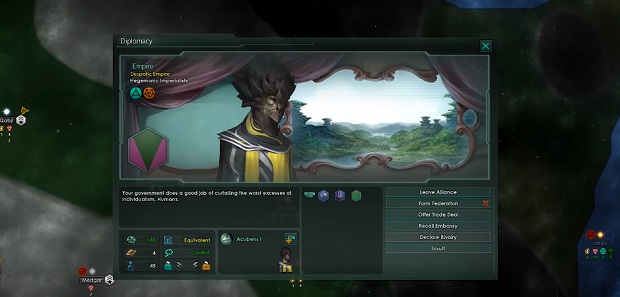
Intuitively, you’ll stick scientists who can boost a particular branch of research to work where they’re most obviously useful. But consider swapping the xeno expert in your biology labs for someone with a passion for military tech and you’ll increase your chances of picking out certain types of card (virulent horror-weapons, most likely). It’s one of the few areas in the game where you can push the numbers in your favour, trying to shape the future somewhat, without directly seeing those numbers. Opaque, where so much is transparent.
Thematically, most of these choices make perfect sense to me. The muddle of historical politics and personalities has been replaced by a more monolithic view – the present, for these spacefaring civilisations, is knowable; the future is not. That’s why the mysteries and wonders of Stellaris so often exist at the edges of what is known: in the tech screen and in the extra-dimensional terrors or spiritual awakenings of the event chains. It’s a 4X game that leans heavy on the exploration and exploitation, asking what you will find and how you will choose to deal with it rather than how many new worlds you want to conquer, even if many campaigns will end in intergalactic warfare.
And it’s brilliant. I’d expected something messier and sometimes the edges are a little too clean and tidy, without the room for chaotic simulation that is such an integral part of Crusader Kings II. Stellaris is far closer to its 4X inspirations – Sword of the Stars, Distant Worlds, Ascendancy etc – than it is to Paradox Development Studio’s historical grand strategy titles, but it’s been carefully constructed so that there is room for growth in certain areas. Diplomacy and politics both feel like satisfactory foundations rather than fully-fledged systems at present, and the nature of the event chains opens up all manner of possibilities for new stories.
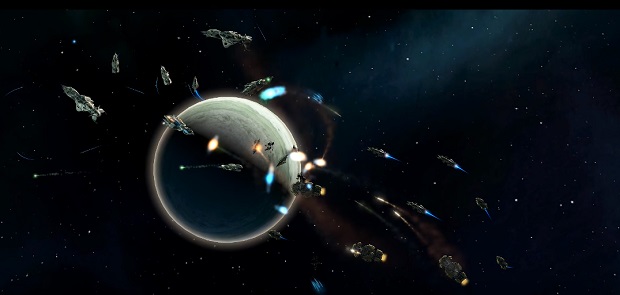
I say that I’d expected something messier and part of me had hoped for something messier. That messiness may come with expansions and DLC, but for now Stellaris is incredibly assured and confident, if perhaps a little too tidy and streamlined. It’s one of the most accomplished 4X space games I’ve ever played, but it feels knowable. Despite all of the randomisation and the extraordinary influence of Fallen Empires and other features that shake the 4X formula hard enough to make it wobble, this is a game that can be understood, analysed and mastered. Doing so has been, and will continue to be, a joy, and yet I crave the early days of exploration before the galactic map became a place on which to exterminate the competition rather than to find new ways of living.
The great experiment of the game was not so much the change of scenery, from history to science fiction, it was the decision to create a Civ-like game of expansion with some complexities and aspects of simulation borrowed from grand strategy. It’s in the simulation of a living galaxy that most of the complexity has been lost, but what has been gained is a precise and finely tuned machine. Less erratic and surprising than its ancestors, but much more elegant in its design.
Stellaris is out today, 5pm UK time.
- Joined
- Jan 28, 2011
- Messages
- 97,503















http://www.pcgamer.com/stellaris-review/
STELLARIS REVIEW
Stellaris's early game is a wondrous thing. You, the ruler of a newly space-faring empire of mammals, avians, fungoids, or any one of a number of other weird, alien lifeforms, are set free to explore and discover the galaxy. It's mysterious and alluring. You select your science ship and send it off to neighbouring stars, scanning each to discover new life and new civilisations. These are the voyages of the USS Spacey McSpaceface.
As you explore you'll find resources to fund your expansion, which can be harvested by building mining stations. You'll find anomalies, which can be researched to uncover new technologies and trigger quests. You'll meet other species, often friendly but sometimes not. And, when you're not venturing into the unknown, you'll look after the needs of your home planet, constructing buildings for your citizens to work. Sid Meier once called a strategy game a series of interesting decisions, and Stellaris's opening hours are packed full of them.
That Stellaris isn't turn-based creates a fluidity to the action. As with Paradox's previous grand strategies—such as Europa Universalis IV or Crusader Kings II—Stellaris moves in real time, but with the option to pause, slow or fast forward. Rarely in the early game did I feel comfortable speeding up the simulation.
Paradox has a reputation for creating impenetrable systems. Before Stellaris, the studio's most accessible game was Crusader Kings II – a medieval soap opera that nonetheless required a basic knowledge of feudal politics to effectively play. Historical quirks aside, though, these games rarely require complex interactions. With Stellaris, the same holds true. The difference here is the presentation and UI, which work overtime to make things easy to parse. I never felt like I was fighting with the interface. All the major interactions are only ever a single click away.
Thanks to the slick interface, you're free to concentrate on the personality of your empire—roleplaying as peaceful explorers, militaristic zealots, reluctant xenophobes, or many other options available from the trait lines offered during faction creation. Different traits offer bonuses and penalties that inform your decisions, and in some instances restrict your options. Only collectivists can enslave their populations, while fanatic individualists can't prohibit migration.
Your empire's style extends beyond their personality and look. You can build ships, using a simple module system to equip weapons, armour, shields and power cells. You can also assign specific scientists, planetary governors and research admirals, each with their own traits that provide bonuses or, in certain situations, debuffs. In one instance, I was informed that my scientist had developed a habit for substance abuse, significantly cutting their life expectancy. While purely a mathematical penalty, it's presented in such away that adds texture to the story of my empire.
Scientific research also has a random element. Rather than a visible tech tree, each research branch—biology, physics and engineering—offers three potential research options. The tech tree is there, but it's not fixed. Develop an early laser weapon, and your next set of options may present the next tier, or may offer three entirely different options. At times it can feel arbitrary, but it's an effective way of forcing you improvisation. And sometimes you're jumped up the tech tree—offered special, rare research opportunities that can give you a significant advantage.
As you continue to expand and explore, you stumble across rival empires. Eventually there's a tipping point, as your knowledge of the galaxy expands to include its major players. The basic shape of galactic politics begins to reveal itself, and exploration gives way to diplomacy and conquest. Unfortunately, this point signals a major shift in Stellaris's pace. That unrelenting sequence of moment-to-moment choice and consequence instead becomes languid and restrictive.
Maybe it's my own lack of imagination, but I can't see a route to the end game that doesn't involve force. The two victory conditions are owning 40% of the galaxy's colonisable worlds or subjugating all of its empires. The galaxy is a crowded place, and so both require military action. As the citizens of my avian empire would say: you can't make a space omelette without breaking a few space eggs. Embracing aggression, I settled into a rhythm of declaring war, taking some territory, and appeasing the conquered planets in time for the next big conflict. It created a mid-game of peaks and troughs, with sudden bursts of action punctuating long years of economic and military growth.
To an extent I applaud Stellaris for not including science or culture victories—win states in which the entire galaxy stops to recognise your insurmountable greatness. But, while contrived, such victory conditions are inelegant solutions to a problem Stellaris doesn't resolve. 4X games aren't endless, and so it's good to provide endings that tailor to each specific play style.
Stellaris isn't just a 4X, though. It's as much a grand strategy, a genre that favours a more sandbox style of campaign. Games such as Europa Universalis 4 or Crusader Kings 2 don't have an obvious victory to strive for. They're alternate history fan fiction, in which the story emerges from both your successes and failures along the way. Ultimately, Stellaris sits awkwardly between the two styles. It does have specific, measurable victory states, but they heavily favour a certain type of play.
A consequence of all this is that diplomacy feels rather lightweight. Yes, deals are made and pledges signed—migration access, which lets populations freely move between two empires, is a particularly nice touch. But, in my experience, the galaxy trends towards inertia. Once an AI alliance is locked in, they're BFFs for life. This was particularly galling in one instance, when I attempted to court two empires in an alliance with each other. Both adored me, and, had they been independant, would have each jumped at the chance to join my alliance. Both refused, though, simply because they were allied to one another. I don't want to cast aspersions on fungoid or molluscoid species, but I, a human, can imagine a pretty obvious solution.
Nevertheless, a galactic standoff between small, rival alliances and federations has the potential to be exciting. Unfortunately, it wasn't. In an effort to shake up the end game, Stellaris can trigger one of a number of galactic crises—in my case an external peril that threatened to engulf the entire galaxy. For a while, it seemed serious. This new faction—the Unbidden—was expanding at an alarming rate, wiping out a number of existing empires. Their growth stopped just as suddenly, but their continued existence negated any aggression from the AI empires.
The Unbidden's presence gives me a +200 opinion modifier with every empire in the game. This, I suspect, is why alliances are unbreakable—had I been able, I could conceivably now ally with the entire galaxy. The opinion buff has another, more pernicious effect. Each empire I attack remains cordial with me after peace is declared. I'm acting like a colossal jerk, and nobody dares raise a finger, let alone a fleet. The same is true of relationships between other empires. It's been decades since an AI player last declared a war.
The solution, I suspect, is to remove the threat by defeating the Unbidden. That in itself is no easy task. They appeared on the opposite side of the galaxy, surrounded by empires that I don't—and can't—forge an alliance with. The diplomacy trade screen lets you negotiate for the right to send military ships through another player's territory. That would work, but only empires you share a border with will ever agree to such a deal. Fair enough, perhaps, but I was negotiating with an empire that bordered my ally. I had a direct, legal route to them, but the result was still the same.
Eventually I took the only path available to me: declaring war and taking the territory for myself. Now I can defeat the Unbidden, something I must do alone. There's no way to coordinate an attack with other AI players, even against a mutual threat. I can't even formally declare war with the Unbidden, thus dragging my allies into the conflict. Their fate rests solely on my shoulders. It feels weird to expend so much effort just so other empires will hate me again, but the alternative is a galaxy trapped in the status quo.
I'm disappointed, because Stellaris's first few hours hinted at a smart, scintillating reinvention of the 4X. The early game is packed full of personality, but it's squandered as the hours roll on. Maybe I had a particularly bad late game experience—the random nature of each campaign suggests many potential outcomes. But the glacial pace feels intentional, and the long periods of inaction bring other limitations to the fore. How most research is purely a stat boost, with only a scant few technologies progressing the story in fun, inventive ways. How presidential candidates have so few mandates, often cycling between just two basic objectives. How espionage is an obvious omission, especially when effective combat is so dependant on information.
None of which is to say Stellaris is a bad game, just an inconsistent one. Given Paradox's history, I hope upcoming patches and expansions can fill in the gaps, and smooth out the omissions and weird quirks of diplomacy. I desperately want the full game to match the promise of its opening. Tweaked in the right way, Stellaris has a chance to become an enduring classic. Right now, it doesn't meet its full potential.
THE VERDICT
70
STELLARIS
The early game promises an instant strategy classic, but Stellaris is unable to maintain that pace.
- Joined
- Jan 28, 2011
- Messages
- 97,503















http://www.pcgamesn.com/stellaris-review
Stellaris review

Europa Universalis, but in space. What a pitch. That is, broadly, what Paradox Development Studio have tried to created with Stellaris, kicking their complex brand of strategy into a future filled with alien leviathans, dictators with tentacles, and plenty of exploding space ships. It’s more than just those five words, however.
Fancy playing Stellaris online? Here's what we thought of Stellaris multiplayer.
It’s a 4X game, for one, which means that straight away Stellaris feels more focused and objective-driven than not just EU, but most of Paradox’s grand strategy fare. But almost all of the Xs have been tweaked in such a way that, though they haven’t been redefined, they are capable of surprising with unexpected consistency.
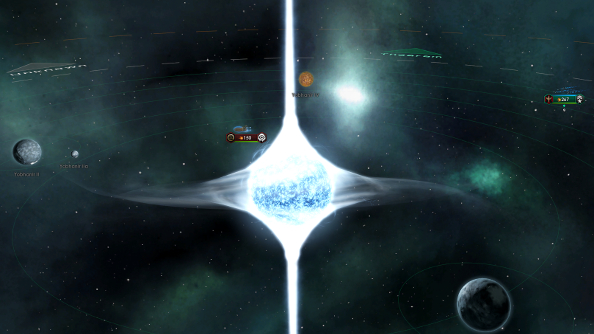
I want to talk to you about the noble Psaurion species. They are a race of genius space dinosaurs who want nothing more than to spread their scaly limbs throughout the galaxy in the hope of learning more about the universe they inhabit. They are staunch individualists, have long since shrugged off the yoke of religion and embraced a life of materialism and scientific progress, and though their bodies may be weak, they are more than capable of standing up to any alien aggressors thanks to their vast robotic army.
This description of my latest Stellaris species has no fluff. Everything you see written above is both integral to the race and grounded in the mechanics of how they function, as well as the narrative that has organically developed as I’ve led them on their adventure across the stars. And much of this description comes from the race customisation feature that you might find yourself dabbling with before you even look at space.
So their intellect comes from the intelligent trait, one of four negative or positive traits selected from a much larger list that includes decadence, longevity, agrarian proclivities and so on. The fact that they are weak also comes from this list. On the surface these are mostly stat modifiers, but they also inform a lot of later choices.
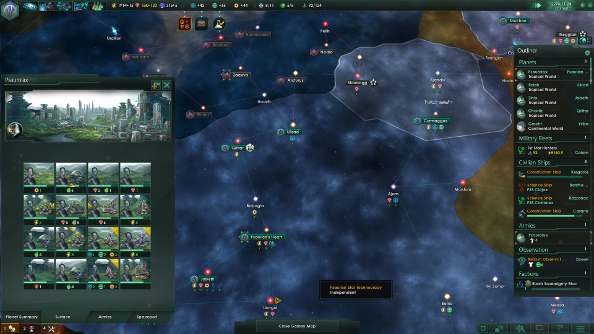
The Psaurions’ natural physical limitations, for example, means that their ground troops – used when conquering a planet – are a bit rubbish. This is what inspired me to research robotics, giving me robotic soldiers to make up for the squishiness of my organic ones. But this also sent me down the path of exploring robotics and AI in greater detail. While these automatons started as servants and warriors, I eventually gave them the same rights and privileges as my organic citizens, limiting how much control I had over them, but also making me feel much better about all those years of enslavement.
A whole arc of the story of the Psaurions is now dedicated to the liberation of synthetic lifeforms, and it all started because I gave my species the weak trait that simply makes them crap in a fight.
The impact of these very early decisions can be seen even more clearly with the ethics of your government. At species creation, there are two circles that offer up various ideologies. There’s your militant ideology, and it’s opposite, pacifism, collectivism versus individualism, xenophobia and xenophilia, and finally spiritualism and materialism. The second circle is full of fanatical versions of these ideologies, and you pick one from each.
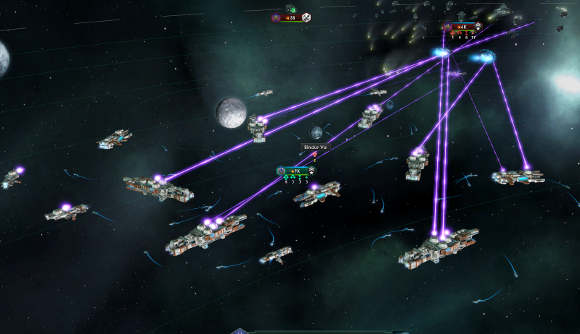
Again, these are just stat modifiers. But that’s not where their effect ends. First off, your selection determines what forms of government you may select, running the gamut from a science directorate where an elite council of boffins rules the roost, to free and open democracies.
So making these wee choices that, at first, appear to just offer tweaks to your species’ stats actually has a dramatic ripple effect, informing the entirety of the game. They determine if you have elections or not, how your citizens react to slavery, how other factions view you, even if you can declare war or not. Look just behind the numbers, and these traits are revealed to be important, meaningful decisions. Apart from Endless Legend, I don’t think there’s another 4X game that really encourages players to understand exactly who they are playing as.
I found myself asking a lot of questions to the mirror while playing Stellaris. Do I want a species that can sail through the stars, unrestricted, using warp technology? Or would I rather use flashy, instantaneous travel through wormholes that I need to actually construct? Or maybe I’ll use hyperlanes that spread out like a web in space. In any other game, I’d be stuck with one, but all three are options in Stellaris, and each come with their own unique strengths, weaknesses and counters. Wormhole gates can be destroyed. Warp is slow. Hyperlanes force you to be more predictable. There’s a lot to worry about.
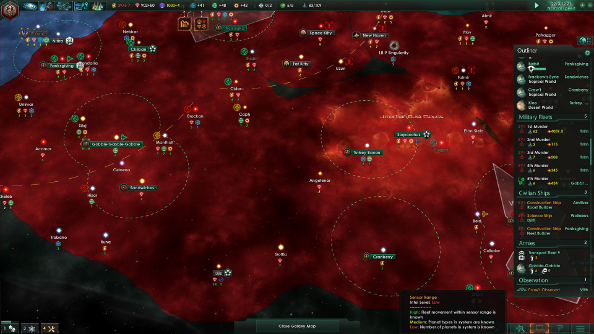
Any sort of star ruler fantasy you have can be played out in Stellaris. You can interfere with primitive species, doing experiments on them, infiltrating their government, giving them advanced technology… making crop circles. You can enslave entire empires – even your own – and force them to build monuments to your might. You can be Starfleet, the Galactic Empire, whatever the hell the Banking Guild was. Choosing what space dreams you want to live out is is empowering, sure, but it’s the way the galaxy reacts to these ambitions and choices that elevates Stellaris beyond some of its contemporaries.
Let’s go back the our pals, the Psaurions. They had finally discovered how to colonise arctic worlds. This was partially luck, partially the plan. You see, you can research three technologies simultaneously, split between social, physics and engineering paths. And you select them from a list of three, initially, but it can be expanded later. So at first, you have nine techs to research. The game selects what it offers you partially based on your government’s ethics, but also other decisions you’ve made, and partially randomly. The deck is then reshuffled when you choose what tech to study.
This keeps research as a steady stream of surprises, but can sometimes really put a spanner in the works when you desperately need to upgrade your ships but the right option just isn’t popping up. Importantly, though, it avoids the boring cycle of always choosing the same technologies and anally planning all of your research right at the start of the game.
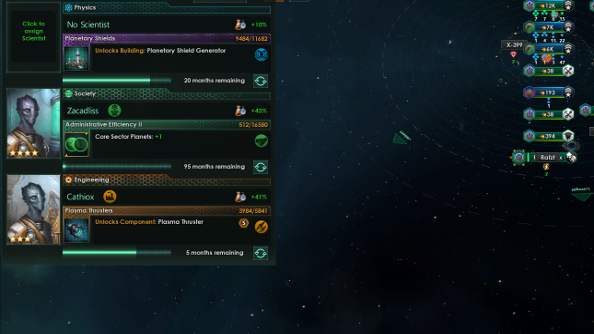
Anyway, Arctic world colonisation was researched, and I shuttled a bunch of colonists off to a lovely, if chilly, new home. I let them get on with it, at first. The planet was in one of my empire’s automated sectors (you can only control a certain number of worlds manually, starting with five), so new buildings were constructed without me needing to be involved, beyond setting a focus. Starports and fleets are not similarly automated in sectors, which does increase the amount of micromanagement (not helped by a click-heavy UI), but also means that you won’t get the AI wasting resources on unnecessary fleets.
I had almost forgotten about my arctic colonists, but then a window popped up. An event! The text explained to me that, to settle this new world, some of the Psaurions were augmented, and this has now led to children being born on the world with genetic mutations. They called themselves Psaurion Mutatis. An off-shoot species had been born. Interesting, right? No. It soon proved to be devastating.
Regular Psaurions and mutants started to clash. The mutants also started to change, evolving and augmenting themselves. They became stronger. Their fertility increased. Violent demonstrations began. Riots plagued the planet. Both groups were just as guilty, and the future for the colony was looking grim. I decided to check in after not hearing from them for a while. The reason became disturbingly clear. There were no more Psaurions left. The mutants had killed and outbred their enemies. And to make matters worse, the racial tension they experienced also made them develop the xenophobic trait. They hate everyone now.
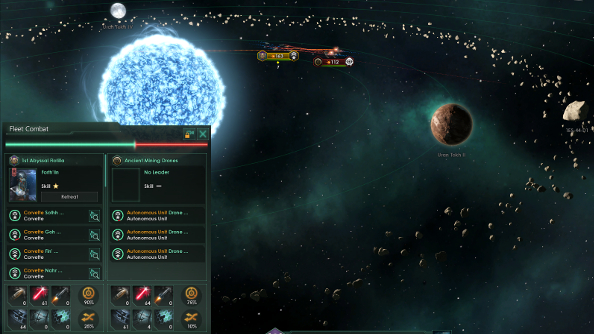
Alongside the semi-random events that breath life and dynamism into the galaxy are quests that will rapidly fill up your situation log, offering up undoubtedly the best writing in any game from the studio, and just as importantly thrusting you out into space to explore further afield. They give purpose to that sometimes overlooked X, making journeys across the stars more than just a hunt for colonisable worlds and more resources.
I’ve searched the other side of the galaxy just to find exotic critters to add to my xeno zoo, and in my quest to understand an ancient race of seemingly evil synthetics, I’ve made deals and bargains with aliens so I can get access to their territory. The quest rewards alone make them worthwhile, often giving big bonuses to research, but it’s their context and the way they push you into diplomacy and even conflict that makes their inclusion so welcome.
And yes, I have declared war on an empire just so I could get a new pet.
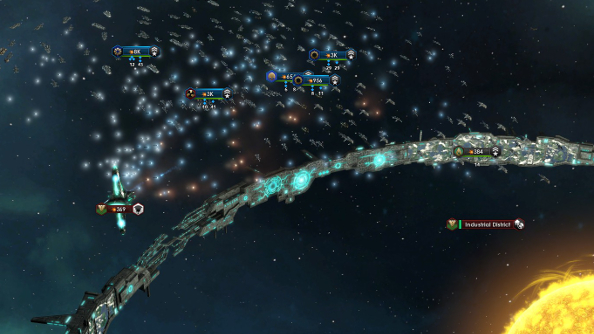
War in Stellaris is very Paradox. When you declare war or another species declares war against you, war goals have to be set. You can demand vassalisation, along with the ceding and liberation of planets. The options aren’t as rich as those from EUIV or CK2, but the intent is the same: making defined goals for a war and clear end point. So, vassalisation, for example, is worth 60 war score. Once you hit that number by defeating fleets and conquering planets with orbital bombardments and ground invasions you can offer the vassalisation deal and voila, you now have your very own, disloyal vassal.
Battles themselves play out in real-time on the galactic map, and visually they are an absolute treat compared to Stellaris’ grand strategy predecessors. All the tiny details are on display, from missiles being knocked out by point defense cannons to the different appearances of various projectiles. In action, these scraps look like EVE Online or Sins of a Solar Empire battles, especially when a massive federation goes to war against one of the mighty 'fallen empires', with their advanced tech and gargantuan armadas. You’ll probably end up staring at the battle menu more than the fireworks display, though. It’s full of sexy numbers like how much damage you lasers are doing and how much punishment your shields are taking. They give you an idea of what weapons your foes are using, and how you might be able to counter them with another fleet if the battle isn’t going very well.
Building the fleets you’ll be using to duke it out with your horrible alien foes hits that sweet spot between simplicity and freedom. Ship design is purely practical rather than cosmetic, but the list of potential modules can, after a lot of research, become staggering. Ultimately, making these vessels is about balancing the energy need of the ships. Every laser and shield has an energy cost, increasing the number of energy-providing modules while reducing open slots for other things.
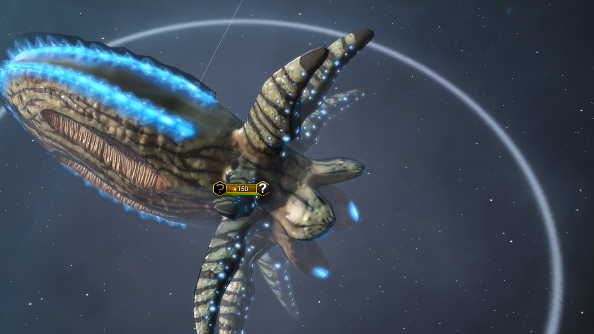
While a lot of mods are straight upgrades, others provide more exotic bonuses. A personal favourite of mine is the giant amoeba strike craft. Instead of sending ships from my battleships, I launch aliens at my enemies, which was only possible after completing a quest involving the alien amoebas and then researching the new technology I’d discovered.
War is very much a mid-game thing, and represents a distinct change in pace and tone. In the early part of the game, it’s all about exploration and expansion through colonisation. Your time will be spent doing quests, building up infrastructure, and mapping out a potentially massive galaxy of up to 1,000 stars. At that point, with limited technology and piddly little fleets, wars can be a bit dull, so the dearth of them never feels like an omission. And when they do start flaring up with greater frequency, it’s when the galaxy is ready to do something interesting with them.
It’s when federations are formed that the galaxy really becomes a dangerous place. Federations are like super alliances where leadership is rotated. All it takes is for the current leader to declare war on an enemy on a whim to send everything spiralling down into chaos. It’s lovely. And the aftermath is just as interesting, as power vacuums are left or new empires appear after having their worlds liberated.
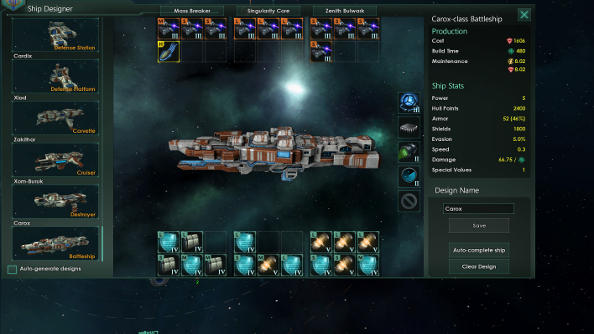
During the mid and late game, I do find myself missing the calmer, more optimistic age of exploration. As war becomes more of a focus, events, quests and surprises diminish. This is not to say that the game stagnates, or that there’s nothing new under the sun when you reach this point. It’s just that the rhythm of the game starts to feel more familiar, less novel. Conquest can open up new worlds to you, and thus new events and big space emperor calls that you’ll need to make, but not with the same frequency as the halcyon days of mapping the galaxy.
There are lulls, between wars, where speeding the game up becomes necessary. The lulls always break thanks to some new crisis or conflict, but I don’t think they need to happen at all. The issue, I think, is that there simply isn’t enough to do with other factions. The paucity of options becomes even more obvious if you’d rather not get into a war.
Espionage is essentially non-existent, for instance. Getting information about another empire’s ships and tech usually necessitates a war. All you really know before that is how their fleet strength and tech level compares to your own. A more glaring omission, however, is the lack of trade. Aside from directly selling resources in the diplomacy screen, trade is entirely invisible in Stellaris. No freighters, trade routes, merchants, businesses – this massive section of the economy essentially doesn’t exist.
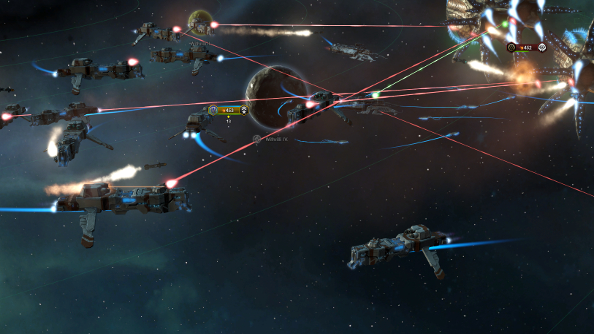
I don’t want to say, “Oh, it’s fine because anything it lacks will be shored up with DLC,” even if it is probably true. Paradox are prolific DLC developers, and I wouldn’t be surprised to find espionage and an expanded trade system added before too long, hopefully along with quality of life UI improvements like the much needed map modes that are normally integral to a Paradox grand strategy game – the map becomes pretty hard to read once all the empires are rubbing up against each other. But their absence at launch is weird and does make interacting with other empires a bit more perfunctory.
Confession time: I find myself guilty of the critics crime of forgiving a game. I want trade and espionage, I want my dealings with aliens to be more meaningful, but I’m still besotted with massive chunks of Stellaris. Most of it, really. From the stellar (I promised myself I wouldn’t do this, but who was I kidding?) soundtrack to that warm feeling I get when I enslave a whole planet full of cute space turtles, Stellaris offers up a galaxy that I can’t not immerse myself in.
Calling Stellaris Europa Universalis in space is probably reductive, but it was the first thing I did in this review not because they are almost exactly alike, but because, when I put away my empires and get on with my day, the stories that have played out in these digital worlds embed themselves in my brain, and I so desperately want to tell people about them. Both games tickle the part of my brain that wants every battle to have some greater context, every move I make to be part of a larger narrative. Stellaris manages to do this without history to lean on, though, and does so with aplomb.
9/10
- Joined
- Nov 20, 2012
- Messages
- 1,653







YT review by Marbozir
- Joined
- May 25, 2006
- Messages
- 8,363
IGN review http://www.ign.com/articles/2016/05/09/stellaris-review
Verdict: 6.3/10
Some serious butthurt over at the Paradox forum right now, all the frothing fanboys hanging around waiting for the release are getting themselves worked up.
Verdict: 6.3/10
Some serious butthurt over at the Paradox forum right now, all the frothing fanboys hanging around waiting for the release are getting themselves worked up.
GrainWetski
Arcane
- Joined
- Oct 17, 2012
- Messages
- 5,103
So Marbozir calls diplomacy good and IGN calls it bad.IGN review http://www.ign.com/articles/2016/05/09/stellaris-review
Verdict: 6.3/10
Some serious butthurt over at the Paradox forum right now, all the frothing fanboys hanging around waiting for the release are getting themselves worked up.
MoLAoS
Guest
Game just released, downloading just finished. Let's check the hype train for derailment.
MoLAoS
Guest
Hahaha, brutal. And true also. Sectors blow.IGN review http://www.ign.com/articles/2016/05/09/stellaris-review
Verdict: 6.3/10
Some serious butthurt over at the Paradox forum right now, all the frothing fanboys hanging around waiting for the release are getting themselves worked up.
I am actually hyped about how shit certain parts of Stellaris are since that means they didn't eat into my potential player base, assuming I ever finish my game.

Downloading right now, who wants to MP?
- Joined
- Jan 28, 2011
- Messages
- 97,503















I'll probably torrent this at some point with all the DLC. Paradox expended all my goodwill long ago. If nothing else though, I'll start a bunch of wars to map-paint a phallic-shaped empire. A Great Penis Across The Stars.

How can you possibly play a game multiplayer without trying it out first?Downloading right now, who wants to MP?
Lemming42
Arcane
Managed to silence the voice in my head screaming at me to wait until it goes down in price. Installing, braced for regret.












